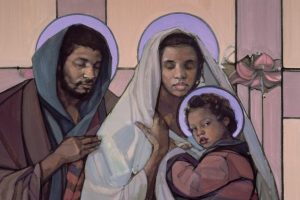Researchers say the church in the United States is in decline. They point to statistics that track attendance at places of worship and how Americans describe their religious affiliation—or lack thereof. According to the Pew Research Center on Religion and Public Life, the number of Americans who identify as Christian declined 7.8 percent from 2008 to 2014, while the number of religiously unaffiliated Americans climbed 6.7 percent.
But the numbers don’t tell the whole story, says Sister of Charity of the Incarnate Word Teresa Maya, who became president of the Leadership Conference of Women Religious (LCWR) in August 2017. God continues to call people, young and old, to share the good news and practice lives of justice, simplicity, and community.
“In many ways, those glorious stories of the 1950s and ‘60s have anchored us in the past,” Maya says. And while recognizing the past is important for institutional memory, religious congregations must accept that to live the incarnation is to accept change.
“We are about Jesus’ message, Jesus’ way of being in the world,” Maya says. “We are about the Christ who lives among us and with us and calls us always to a resurrection life.”
What makes you optimistic about the future of religious life?
Religious life is about God. It’s not about us. It’s about the Jesus story, which continues to captivate and call people. If you look at religious life as a purely human institution and you don’t see the transcendence that’s there, you’re not seeing who we are. There is a mystery to our life and to our call. That mystery is the heart of my optimism.
I remember asking a long time ago, when I’d meet some of the younger people entering discernment, “Why do you want to enter this congregation? We’re all old.” They’d say, “Because God called us.” The divine within and among us is calling us to service. It is calling vocations. It’s not a hundred, not a thousand, but a precious few. Religious life may not be numerically significant, but that doesn’t mean it’s going to be insignificant.
I also think we need to be optimistic because there’s something afoot. God is stirring things up. We need to trust that. It is a call to faith. Young people today have at their core a longing for something else or something more. We need to create a space for them. As long as we do that, it’ll be OK.
Does religious life in the United States need to change?
Change is how you live the incarnation because it’s happening all the time. In other words, change is life. We grow, we have experiences, we suffer through things. There is loss, and there is always something new to learn. We need to live the incarnation in a prophetic way.
In many ways, it’s not whether you do or don’t like change, it’s how you live change. We need to understand that the incarnation is the transformative conversation that God has with us and that the transforming conversation happens always in the present. It happens when we engage the present.
We need to continue to be in conversation with the present and with what’s going on around us. We need to see the signs and the needs of the times. If we do that, we change. We become who God wants us to become.
As a conference, the LCWR has embraced change, but there is a way in which we want to embrace it, an attitude that we need to have. We need to do it from a contemplative stance that allows us to notice, to really pay attention, to look at things, and to listen deeply. At the same time, it’s a collaborative effort. It’s not about me. It’s about us, a process of community.
In many ways, we need to embrace change because of God’s people, because of the mission that we’re called to serve and the dignity that we need to offer to everyone. It doesn’t matter where they’re from or who they are. It’s about community, a community in mission. You can’t separate them.
You’ve used the phrase “the mission is in the moment” to describe religious life. What do you mean by that?
In response to the numbers of people joining religious life, I’ve heard a lot of “I was in a class of 40 novices, Teré.” I’ve been hearing that for 22 years. I was in the class of one novice. One novice.
We need to know our history. But we need to own our identity. We need to also own the light and shadow in that identity—but not because we’re going keep looking at it. We live the present.
Then we can start to look around and discover there are new things we can do. First of all, we need to let go of our lamentations for the past, to look at the present as a gift, and to look at the amazing things the present offers us, especially with young people.
My brother works for Doctors Without Borders, and of course he’s friends with the Amnesty International team. They’re like a little club. They’re all younger people, and he said, “They all want to meet you because they never met a nun before.” I said, “OK, so I’m your show-and-tell?”
I went, and I had an incredible conversation with them. They’re passionate for justice. They live a simple life. They really care about other people and community. They’re in relationship.
I remember coming home and telling the sisters, “I found the vocations.” God is calling these people to justice, to community, to be there for each other. We’re going to be OK, but we need to be in that conversation with the present.
Sister Nancy Schreck, who was president of LCWR, once asked, “What if the most significant contribution of religious life has not happened yet?”
Every time I remember that I think, “Wow, there’s still something for us to do, to witness, to share.” We have to live the present so we can see the emerging future. There are others with us, not just religious men and women but also laypeople in the Catholic Church, the people we serve, men and women who are trying to make a difference in the world. It’s an incredible time to live.
What do you mean when you say that women religious should “let go, deinstitutionalize, and uninstall”?
I first heard that from Saint Joseph of Peace Sister Susan Francois. One day we were just having one of those chats, and she said, “You now, Teré, we are going to be part of the great decommissioning.” She had just come from a closing ministry, and I had just closed one of our schools in Mexico with all the heartbreak and sadness and grief that goes with it. We shared about some of that because it’s true.
In many ways, women religious are coming home. We’re older and we’re leaving missions. I think in my nine years in leadership, I have been in at least five or six places where I’ve had to say, “This is the last sister to stay here.” It’s happening whether we say it or not.
Congregation of St. Joseph Sister Mary Pellegrino said, as president-elect of LCWR, that we’re deinstitutionalizing. I think I borrow from that, but it’s really our shared experience that in many ways, we have to let go because we can’t do it all, not in the way we did before. There’s just no way. There aren’t enough of us to fill in all those slots.
In many ways, we need to let go of that institutional mindset. We really need to nurture our institutions and strengthen them, because that is critical right now.
I’m afraid, for example, when sisters leave, that we will shut down a critical service that nobody else is going to take up. We have to figure out a way to partner with other organizations, with the laypeople who share our charism and ministry. We don’t need to be staff. We don’t need to be the managers of those institutions. We need to care about them, promote them, and stay with them in many ways.
I like to say that we need be the madrinas, the godmothers. But, at the same time, we also need to look and ask, “What is our job now?”
A long time ago, I saw a training video about the differences between pioneers and settlers. Religious life really needs to have a pioneer spirit. We need to keep moving to the next. Once we get there, we create institutions, we create, and we organize. But now we’re letting it go for the settlers, and then we’ll keep going. We need our hospitals and our universities to be great places that can really thrive for the community and witness to mission. We also need to start moving to these new frontiers.
They are different kinds of frontiers. They could be cultural. We need to engage with a conversation with our culture, with the people here. We need to have interfaith conversations. We need to be in those places where we meet people of other faiths, learn and respect each other, and hold that space in between. We need to be in conversation and meet people with their different political ideologies and learn civil discourse.
What does fiesta mode look like in the church?
Right now, the U.S. church is going through the Encuentro process. This is where the U.S. Catholic Church can recognize the gifts that the Latino community brings. An encuentro understood in the cultural sense of the Latino community is always a fiesta. When you bring people into your home or you’re going to greet somebody, you dress up for it. You clean the house. You prepare food for them. Just because you got together.
It’s a little fiesta. There’s joy. There’s laughter. Often there is music. In many ways, we need an attitude of encuentro, of coming together. We need to celebrate it, because when we get it, when it happens, when you have a really good conversation, you leave that space with joy. You’re refreshed and renewed. Something transformed you. That’s God. In many ways, we need to have a fiesta mentality in the U.S. church and in our religious communities.
It’s like coming to a dance. I can invite everybody, but if I dance with you, something happens. That’s inclusion. There’s a new kind of conversation. It also has to do with the use of the arts, music, and symbolism. We have lost the place of art in our life. Anywhere you go in the Latino community, there’s music.
Our experience of God needs to show some of it. For example, I love African liturgies. The movement, the dancing, the music, and art need to be part of our experience, of how we share our experience of God. Fiesta has many, many dimensions. It’s a sign.
As Americans we sometimes forget that. We just schedule everything in. You need to leave a little room.
I also think there is this whole sense that fiesta celebrates diversity. The difference that comes together, can stay together, can celebrate, dance, and share the meal. It’s also when we feel that we’re enough.
In my earlier experiences in community we had a lot of sisters in Latin America, in very, very poor parts of the country. I never understood why these people who had so little would go all out on a party. Of course, the practical religious people would be like, “No, you need to save! Why are you spending all this money on the fireworks?”
But I learned from these women, who said, “Oh Sister, don’t you worry, we have enough. We have enough.” I think we need to bring that kind of idea to our spiritual life and religious communities, and just recognize that we are enough. Instead of saying, “We’re less, we’re dying.” It’s like a competition: “How many nuns do you have left this year?”
Who cares? What we have is what God needs to make a party, to have a fiesta.
Study after study shows increasing disinterest in religious institutions. How do you respond to the lack of faith in younger generations?
I’ll tell you a short story. I teach on and off in a Hispanic summer program, which is a program for Latino graduate students in theology. They bring Latino professors because that way the students know it’s possible to graduate and get a degree in theology. The students come from different religious traditions. I asked one of them, “Where do you go to school?” “I go to Union Theological.” So I asked, “So, what’s your religious tradition?” She says, “I don’t have one. I’m a seeker.”
It was really a transformative experience for me last summer because it was the first time that I really entered into this kind of a conversation. What I’ve realized is that “nones” are authentic seekers. When they say who they are, they’re claiming their truth.
In many different ways, there’s a genuine quest for meaning, for transcendence, for connectedness, for community, for justice. When they say, “The institutional church is not doing this for me,” I really respect that. Some places you go to church and you’re like “Oh, my God. No wonder there are so many nones.”
In many ways, we as a church need to recognize that we have some work to do to make our communities welcoming and interesting. Not because church is supposed to entertain but because it needs to be a place of belonging and hospitality.
That authenticity of women religious can really connect with the seekers, the nones in our different places and communities. Some members of LCWR has been having these conversations at Harvard. I’ve really enjoyed reading about them. In many ways, there is a longing for a community that does justice and a quest to really understand what it means to be human and what it means to feel connected. These are the principles that guide all of us so that we can foster human dignity. These are shared values.
That is one of those frontier places for the church. Many of the nones were not raised as anything religious. We know our dark stories of the last few years. We know what’s happened in our U.S. church. We know why so many people have left. We don’t need to look at statistics to know.
It’s critical how we bring back that conversation about what’s fundamental and essential.
When I think of my own experience of vocation or the experiences I’ve heard from other people, it’s always about the day they knew Jesus found them and they found Jesus. That encounter. We need to bring Jesus to this conversation. In our relationship with nones, we need to show them our experience of Jesus. We need to be very transparent and vulnerable as we do it.
There is a vulnerability in this. I don’t want to say we’re going to defend our institutional church, but I do think we need to defend our church’s community. We need to speak to it with a heart for it. We need to say why we’ve stayed in the community. Why we stay in the church. Why we love it.
I was at Mass the other day in San Antonio. It was one of those long homilies where the priest says, “Be on time, wear the right clothes, control your children,” and I was thinking, “Padrecito, remember the gospel? Did you read it?” Then I turned to my left, and there was a young man kneeling in tears. It moved me so much.
I realized that is why I come to church—to pray with others because it makes a difference. It makes a difference to be part of a worshiping community that has staying power and that has meant something to people generation after generation.
But the church also will be different. It will not be the same. It will probably be smaller, which is a good thing. We always think small is bad, but I like that story that Pope Francis shared, “We need to be salt and leaven. You don’t need a whole lot of it to make a good pizza.” In many ways, it’s a new beginning. It’s a fresh start that the nones are calling us to, an opportunity to revisit who we truly are and what is at our core.
This article also appears in the March 2018 issue of U.S. Catholic (Vol. 83, No. 3, pages 34–37).
Image: Naveen Chandra on Unsplash














Add comment